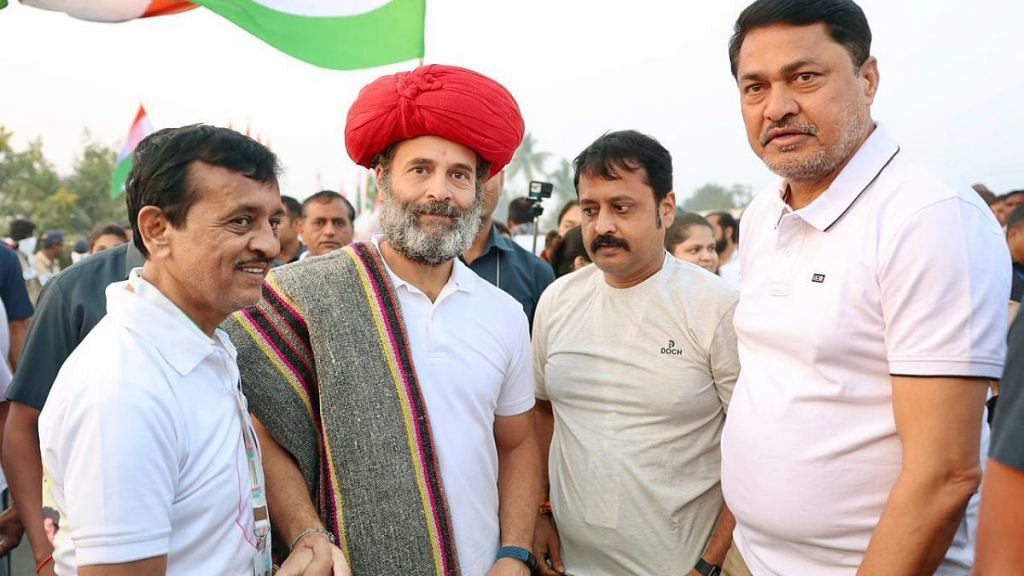It took Savarkar for India’s media to finally take note of the Bharat Jodo Yatra. Arguably, this is apt. It has been over two months since Rahul Gandhi has been walking long, hard and fast. The aim of the yatra is political salvation. With its simple message of religious harmony, and prosperity for all, the epic walk has been focussed on ordinary human connection and interaction. Accompanied by a clamour for hugs and selfies by ardent supporters, the yatra appears nothing less than a public therapy for a stressed nation. Rahul Gandhi’s walk is but a deliberate emulation of MK Gandhi, who made walking the arch act of political protest.
The Indian media has taken little note of it. Until now.
On entering Maharashtra, Rahul Gandhi reminded the press about VD Savarkar’s mercy petition to the British empire. Savarkar had indeed sought his release from the dreaded Andaman Island prison, and his petition was written in the most abject terms of political servitude. This was enough to ignite the media.
Modi has declared that the yatra had now gone ‘political.’ Commentators too have piped in to point out that in doing so, Rahul Gandhi has in fact been politically inexpedient as this reminder from the history archives risks ire from the Congress party’s ally, the Thackrey faction of the Shiv Sena that draws inspiration from Savarkar.
The polarity is triggering as it is both apt and alive. It signals the fundamental political and psychic division at the heart of independent India’s identity, that of MK Gandhi and VD Savarkar, the founder of Hindutva.
Also read: Why poll strategist PK may not be losing sleep over Gujarat yet
Savarkar/Gandhi: A Primer
In our times of an ascendant Hindutva, Savarkar is everywhere. From airport bookstores to political commentators once a shadow character from Indian annals, is now openly redrawing political lines and emotional allegiances, which had until recently been hidden in plain sight.
A protégé of Lokmanya Tilak, the Maratha firebrand and India’s first mass nationalist leader, Savarkar spent his early youth in secret revolutionary societies. Savarkar also learnt to make bombs, shoot with guns and trained young men in similar activities both in India and London where he had decamped to. Savarkar spent considerable time in the archives and took to writing history. He wrote a radical account of the Indian Mutiny of 1857 in 1908 that he iconically dubbed as the ‘first war of Independence’. Deadly activities, secret associations and incendiary prose led to his arrest and extradition to the Andamans.
While Savarkar was in prison, MK Gandhi returned to India from South Africa and consequentially changed the political vocabulary of India and anti-imperialism. This was not a mere stroke of luck. Gandhi and Savarkar had already had an unsuccessful encounter that revealed their differences in London and it is widely speculated that Gandhi’s Hind Swaraj (1909) was directed at Savarkar and his politics. To be sure, from their earliest failed encounter in 1908 in London to Gandhi’s assassination in 1948 by an acolyte of Savarkar in Delhi, the two men created two oppositional views and methods of political visions and ends.
Gandhi’s politics was visible, anti-secrecy and chose dying over killing. Above all, Gandhi as an ardent believer of God and Hinduism in particular, embraced religion to animate a new brotherhood of equals. Truth alone could counter violence; hence his innovative word satyagraha was both a political idea and powerful practice. For Gandhi, any competition over religion only betrayed the believer’s weakness and he was assiduously opposed to both conversion and indeed reconversion (or shudhhi). It was by far the most effective anti-colonial politics in world history.
Savarkar’s steadfast interest remained in violence and war as a source of dynamism in history. A known atheist, he coined the term and creed of Hindutva. Hindutva was explained as a theory of violence. Denoting political Hindu-ness, Savarkar was clear that as a religion, Hinduism posed a significant obstacle to creating Hindutva itself. Fixated on the idea of enmity and its conquest by violence, Savarkar chose both Buddhism and Islam’s Indian journeys as principal political opponents. Secrecy as revolutionary creed was embedded in his writings. Two years after the publication of his manifesto Hindutva and in 1925, the Rashtriya Swayamsevak Sangh was established to realise its ideals.
The rest, as they say, is history.
Also read: Gujarat has two faces of Hindutva. Rahul Gandhi is the only political opposition to it
History Wars
Indian political storylines have returned to the past with a vengeance. In part, this is to create a new political language fit for our times. India’s history wars in earnest began a decade or more ago when the political language of the UPA-era and its liberal welfarism came undone, thanks to raging populism and a rebranded Hindutva under Narendra Modi.
More significantly, a new cultural warfare too started that insisted that there was more than ‘one idea of India.’ In approaching and summoning political victory, Modi and the new cultural warriors aggressively reminded us that ideas and histories that were once consigned to either obscurity or wilfully neglected were now in power. In short, the last decade has installed Savarkar and Hindutva as the dominant and visible creed for the first time in India’s history.
In invoking Savarkar, Rahul Gandhi is only identifying with MK Gandhi. To be sure, history wars are not about the past. They have everything to do with the identity of India today and its future tomorrow. In invoking Savarkar and going against analysts, Rahul Gandhi has shown political pragmatism and taken the lead in drawing lines as India gears up for a long season of its most consequential general election.
Shruti Kapila is Professor of Indian history and global political thought at the University of Cambridge. She tweets @shrutikapila. Views are personal
(Edited by Ratan Priya)
